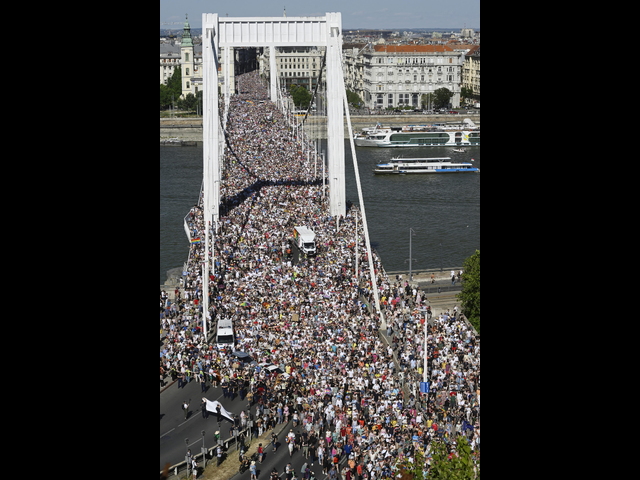
(by Marcello Campo) (ANSA) - BUDAPEST, JUN 29 - A colorful, joyful, peaceful but very determined human tide invaded Budapest. Stronger than Viktor Orban's bans, intimidation and threats, nearly 200,000 young and old, straight and rainbow couples, parliamentarians and ordinary people, shouted their desire for freedom, democracy, tolerance, respect for the rights of all minorities, in Hungary. It was a record-breaking demonstration with numbers not seen since 1989 when Hungarians took to the streets to celebrate the fall of the Berlin Wall. As always, there was singing, dancing, music blasted from trucks, and flags of all kinds, from the traditional Lgbti+ community to those of individual countries. A hundred-foot mega banner depicting the European blue flag stood out above them all. Among the signs were many against Orban, but some also against Ursula von der Leyen. One of them read like this, "You have to decide whether to defend Orban or democracy." In short, much more than just a march in favor of homosexual pride. This Budapest pride, which ended without incident, dealt a huge blow to the sovereignist Magyar government, which had banned the event by law and had facial detection cameras set up along the route. The ultra-right-wing Patria Nostra (Mi Hazank) party threatened to close the Liberty Bridge, over which the procession passed, but on arrival there was only a scattered group of extremists and everything went smoothly. No one here in Hungary is thinking about the possible square-shouldering, yet according to many this demonstration could be an important signal in favor of change. All eyes are on next year's elections where Viktator, as critics call him, may have some difficulty succeeding himself. Today, however, the Magyar premier preferred to avoid a heavy hand and limited himself to a bucolic post with his three grandchildren and the words, "Proud of them." And his main challenger in the elections, Peter Magyar, warned that "if anyone gets hurt today, only Orbán will be responsible." Certainly the rule of law situation in Hungary remains highly controversial. Suffice it to say that in mid-afternoon, as a human river marched dancing through the streets, the police issued a statement somewhere between surreal and embarrassed, complaining about the "lack of cooperation of the protesters" and that "pedestrian and road traffic" was "chaotic." On the street, however, open stores and very few officers, only a few sporadic protesters, a few people addressed by the mass of protesters more with irony, as elements of color, than with concern. Among them all, to the delight of the curious, a pair of picturesque bearded guys, one Dutch, the other Swedish, the former holding a mega crucifix, the latter a Bible, cursing the protesters with apocalyptic anathemas. Anxiety on the eve was high. Shortly before the procession started, the very large delegation of national and European deputies from so many countries of the Union, more than a hundred people, had been kept effectively locked up for more than an hour in the gardens of the City Hall as a precautionary measure. They entered the procession, compactly, behind the mayor, who was greeted with an ovation from the crowd. He himself, Gergely Karácsony, can be counted as one of the day's triumphants: "Thank you, Viktor Orbán, for promoting a more tolerant society," he joked, after he called for participation by calling Pride "a European affair." Present in force was the Italian center-left, never so large. Pd leader Elly Schlein, greeted by kisses from Spanish Vice-Premier Jolanda Diaz, chanted a vigorous "Bella ciao" as soon as she entered the parade, which was also sung by Hungarian protesters. "We are here for freedom and democracy. You cannot ban love by law. You cannot erase people's identity, our bodies, we are people. Banning pride is a violation of European constitutional rights," Schein had made clear. Also present were Action leader Carlo Calenda-"this is the place where all liberals should be"-and M5s MEP Carolina Morace. (ANSA).
